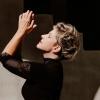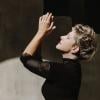
No other singer could have dreamed it up or dreamed of trying it. Leave it to the compelling mezzo-soprano Joyce DiDonato to open the deepest wells of human feeling and experience, of shimmering aspiration and shattering despair, spun out over 90 minutes of grippingly and magnificently performed music from across four centuries in Eden.
This theatricalized solo recital, in the midst of a world tour, landed at Berkeley’s Zellerbach Hall on Saturday, Jan. 21. The presenter, Cal Performances, is a co-commissioner of the work with five other organizations, including Stanford Live, which presented it on Friday, Jan. 20 at Bing Concert Hall.
DiDonato, equally effusive in song, in direct address to an audience, and in print, described herself in a program note as a “belligerent optimist” attuned to the “perfect balance, astonishing mystery, and guiding force of the Natural World.” While at one level Eden is about the existential anxieties raised by climate change and heightened by pandemic isolation, no programmatic label can account for its range and emotional reverberations.

The evening began in velvety, murmurous darkness, light slowly dawning over the 24 onstage musicians of Il Pomo d’Oro as they played the opening unresolved chords of Charles Ives’s The Unanswered Question. Singing from various locations offstage, DiDonato voiced the work’s contrasting melody of plangent wordless speculation. Then, like a bird alighting from afar, she arrived onstage to sing Rachel Portman’s reverent “The First Morning of the World” (2021), with a spiritually Edenic text by Gene Scheer. Over the music’s gently rippling tide, DiDonato gave an animating sheen to the notion of discovering the “language in the rings of trees.”
Dressed in a floor-length, shoulder-baring silvery blue gown, her face lightly aglitter with makeup, DiDonato projected a commanding, febrile presence, by turns noble, turbulent, and wonderstruck. Grasping a curved section of an abstract, circle-based set, the singer used it to suggest a tree, a bow, a sword, a lyre, and perhaps an oar as she rowed her way through selections from Gustav Mahler, Christoph Gluck, assorted Baroque composers, Aaron Copland, and back to Mahler again for a transcendent close. First violinist Zefira Valova doubled as conductor for the fine Il Pomo d’Oro band in both accompaniment and instrumental interludes.

Whether she was singing of nature’s consolations, turbulent love, or the combustive depredations of war, DiDonato was nothing less than spectacular. Her expressive articulation of the texts (supertitled in an audience-friendly large font), exquisite phrasing, and masterly dynamic control made for musicianship of the highest order. The selections supplied the added value of introducing kinetic music by 17th and 18th-century composers — like Biagio Marini, Josef Mysliveček, and Giovanni Valentini — unfamiliar to many concertgoers.
When Copland’s “Nature, the gentlest mother” arrived just after Mysliveček’s dramatic 1771 account of Adam and Eve’s expulsion from the Garden of Eden, it came as a catharsis of vocal delicacy and instrumental birdsong. Effective as that juxtaposition was, DiDonato reserved her crowning achievement for last, pairing Handel’s beatific “As rosy steps the morn” with the aching consolations of one of Mahler’s Rückert-Lieder, translated as “I have become lost to the world.” In the show’s sublime final lines, DiDonato filled the hall with the enriching vision of a deep, stilled attention: “I live alone in my heaven, in my love, and in my song.”

Director Marie Lambert-Le Bihan and lighting designer John Torres framed Eden in striking terms. Two large circles rose and rotated about the singer, the stage washed in color-saturated light. By evening’s end, the visual elements did begin to wear out their welcome, like a Cirque du Soleil spectacle in slow motion.
After all she had given, DiDonato had more to offer. She delivered an earnest speech, in which she allowed that she was still figuring out what Eden was after performing it in 23 cities. She summoned the Piedmont East Bay Children’s Choir onstage to sing a pair of numbers. She returned the favor by singing Handel’s famous meditation on nature, “Ombra mai fu.”
As if that weren’t enough, anyone who wanted one could take home a paper coaster embedded with chamomile seeds. Literally and figuratively, DiDonato made a plea to plant new life around a troubled, hope-lit world.




